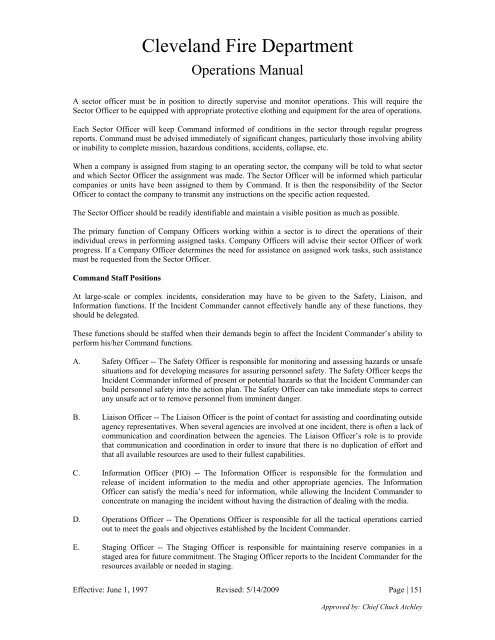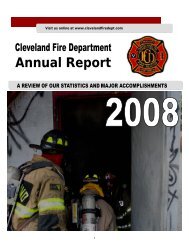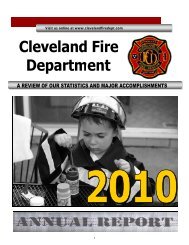SOP Manual - Cleveland Fire Department
SOP Manual - Cleveland Fire Department
SOP Manual - Cleveland Fire Department
- No tags were found...
You also want an ePaper? Increase the reach of your titles
YUMPU automatically turns print PDFs into web optimized ePapers that Google loves.
<strong>Cleveland</strong> <strong>Fire</strong> <strong>Department</strong><br />
Operations <strong>Manual</strong><br />
A sector officer must be in position to directly supervise and monitor operations. This will require the<br />
Sector Officer to be equipped with appropriate protective clothing and equipment for the area of operations.<br />
Each Sector Officer will keep Command informed of conditions in the sector through regular progress<br />
reports. Command must be advised immediately of significant changes, particularly those involving ability<br />
or inability to complete mission, hazardous conditions, accidents, collapse, etc.<br />
When a company is assigned from staging to an operating sector, the company will be told to what sector<br />
and which Sector Officer the assignment was made. The Sector Officer will be informed which particular<br />
companies or units have been assigned to them by Command. It is then the responsibility of the Sector<br />
Officer to contact the company to transmit any instructions on the specific action requested.<br />
The Sector Officer should be readily identifiable and maintain a visible position as much as possible.<br />
The primary function of Company Officers working within a sector is to direct the operations of their<br />
individual crews in performing assigned tasks. Company Officers will advise their sector Officer of work<br />
progress. If a Company Officer determines the need for assistance on assigned work tasks, such assistance<br />
must be requested from the Sector Officer.<br />
Command Staff Positions<br />
At large-scale or complex incidents, consideration may have to be given to the Safety, Liaison, and<br />
Information functions. If the Incident Commander cannot effectively handle any of these functions, they<br />
should be delegated.<br />
These functions should be staffed when their demands begin to affect the Incident Commander’s ability to<br />
perform his/her Command functions.<br />
A. Safety Officer -- The Safety Officer is responsible for monitoring and assessing hazards or unsafe<br />
situations and for developing measures for assuring personnel safety. The Safety Officer keeps the<br />
Incident Commander informed of present or potential hazards so that the Incident Commander can<br />
build personnel safety into the action plan. The Safety Officer can take immediate steps to correct<br />
any unsafe act or to remove personnel from imminent danger.<br />
B. Liaison Officer -- The Liaison Officer is the point of contact for assisting and coordinating outside<br />
agency representatives. When several agencies are involved at one incident, there is often a lack of<br />
communication and coordination between the agencies. The Liaison Officer’s role is to provide<br />
that communication and coordination in order to insure that there is no duplication of effort and<br />
that all available resources are used to their fullest capabilities.<br />
C. Information Officer (PIO) -- The Information Officer is responsible for the formulation and<br />
release of incident information to the media and other appropriate agencies. The Information<br />
Officer can satisfy the media’s need for information, while allowing the Incident Commander to<br />
concentrate on managing the incident without having the distraction of dealing with the media.<br />
D. Operations Officer -- The Operations Officer is responsible for all the tactical operations carried<br />
out to meet the goals and objectives established by the Incident Commander.<br />
E. Staging Officer -- The Staging Officer is responsible for maintaining reserve companies in a<br />
staged area for future commitment. The Staging Officer reports to the Incident Commander for the<br />
resources available or needed in staging.<br />
Effective: June 1, 1997 Revised: 5/14/2009 Page | 151<br />
Approved by: Chief Chuck Atchley




